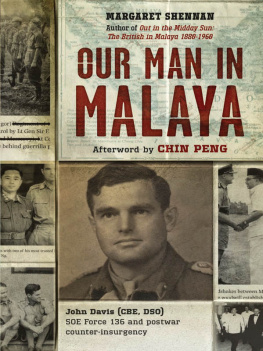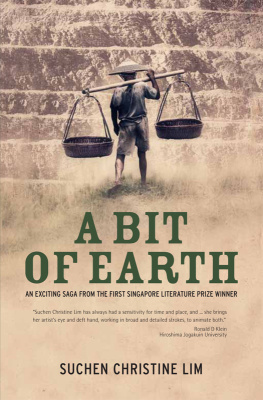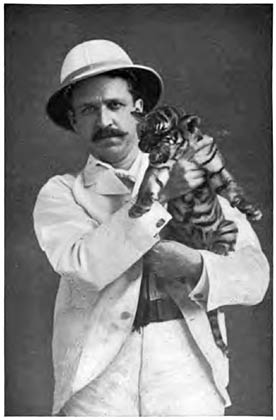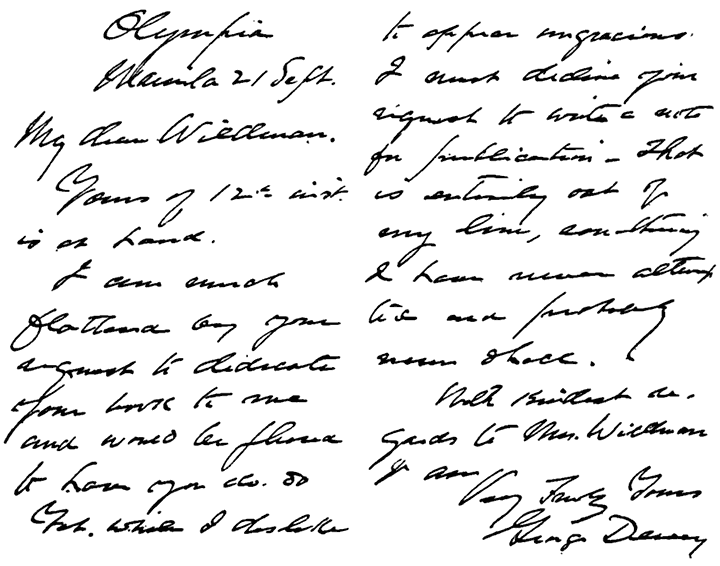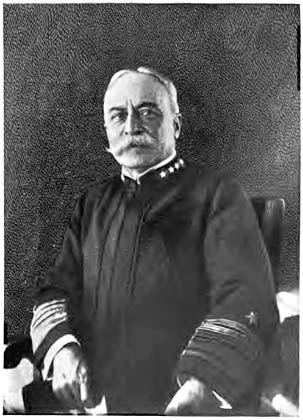
George Dewey, Admiral U. S. Navy
Copyright, 1889, by Frances Benjamin Johnston.
To
Our Hero
And my friend
Admiral George Dewey, U.S.N.
I Dedicate this Book
Flagship Olympia,
Manila, 21 Sept., 1898.
My Dear Wildman:
Yours of 12th instant is at hand. I am much flattered by your request to dedicate your book to me, and would be pleased to have you do so.
With kindest regards, I am,
Very truly yours,
George Dewey.
Preface
These stories are the result of nine years residence and experience on the Malayan coastthat land of romance and adventure which the ancients knew as the Golden Chersonesus, and which, in modern times, has been brought again into the atmosphere of valor and performance by Rajah Brooke of Sarawak, the hero of English expansion, and Admiral George Dewey of the Asiatic squadron, the hero of American achievement. The author, in his official duties as Special Commissioner of the United States for the Straits Settlement and Siam, and, later, as Consul General of the United States at Hong Kong, has mingled with and studied the diverse people of the Malayan coast, from the Sultan of Johore and Aguinaldo the Filipino to the lowest Eurasian and China boy of that wonderful Oriental land. These stories are based on his experiences afloat and ashore, and are offered to the American public at this time when all glimpses of the land that Columbus sailed to find are of especial interest to the modern possessors of the land he really did discover.
Contents
- Page
- Baboos Good Tiger
- Baboos Pirates
- How we Played Robinson Crusoe
- The Sarong
- The Kris
- The White Rajah of Borneo
- Amok!
- Lepass Revenge
- King Solomons Mines
- Busuk
- A Crocodile Hunt
- A New Years Day in Malaya
- In the Burst of the Southwest Monsoon
- A Pig Hunt on Mount Ophir
- In the Court of Johore
- In the Golden Chersonese
- A Fight with Illanum Pirates
Tales of the Malayan Coast
From Penang to the Philippines
Baboos Good Tiger
A Tale of the Malacca Jungle
Aboo Dins first-born, Baboo, was only four years old when he had his famous adventure with the tiger he had found sleeping in the hot lallang grass within the distance of a childs voice from Aboo Dins bungalow.
For a long time before that hardly a day had passed but Aboo-Din, who was our syce, or groom, and wore the American colors proudly on his right arm, came in from the servants quarters with an anxious look on his kindly brown face and asked respectfully for the tuan (lord) or mem (lady).
What is it, Aboo Din? the mistress would inquire, as visions of Baboo drowned in the great Shanghai jar, or of Baboo lying crushed by a boa among the yellow bamboos beyond the hedge, passed swiftly through her mind.
Mem see Baboo? came the inevitable question.
It was unnecessary to say more. At once Ah Minga, the boy; Zim, the cook; the kebuns (gardeners); the tukanayer (water-boy), and even the sleek Hindu dirzee, who sat sewing, dozing, and chewing betel-nut, on the shady side of the veranda, turned out with one accord and commenced a systematic search for the missing Baboo.
Sometimes he was no farther off than the protecting screen of the compound hedge, or the cool, green shadows beneath the bungalow. But oftener the government Sikhs had to be appealed to, and Kampong Glam in Singapore searched from the great market to the courtyards of Sultan Ali. It was useless to whip him, for whippings seemed only to make Baboo grow. He would lisp serenely as Aboo Din took down the rattan withe from above the door, Baboo baniak jahat! (Baboo very bad!) and there was something so charmingly impersonal in all his mischief, that we came between his own brown body and the rod, time and again. There was nothing distinctive in Baboos features or form. To the casual observer he might have been any one of a half-dozen of his playmates. Like them, he went about perfectly naked, his soft, brown skin shining like polished rosewood in the fierce Malayan sun.
His hair was black, straight, and short, and his eyes as black as coals. Like his companions, he stood as straight as an arrow, and could carry a pail of water on his head without spilling a drop.
He, too, ate rice three times a day. It puffed him up like a little old man, which added to his grotesqueness and gave him a certain air of dignity that went well with his features when they were in repose. Around his waist he wore a silver chain with a silver heart suspended from it. Its purpose was to keep off the evil spirits.
There was always an atmosphere of sandalwood and Arab essence about Baboo that reminded me of the holds of the old sailing-ships that used to come into Boston harbor from the Indies. I think his mother must have rubbed the perfumes into his hair as the one way of declaring to the world her affection for him. She could not give him clothes, or ornaments, or toys: such was not the fashion of Baboos race. Neither was he old enough to wear the silk sarong that his Aunt Fatima had woven for him on her loom.
Baboo had been well trained, and however lordly he might be in the quarters, he was marked in his respect to the mistress. He would touch his forehead to the red earth when I drove away of a morning to the office; though the next moment I might catch him blowing a tiny ball of clay from his



